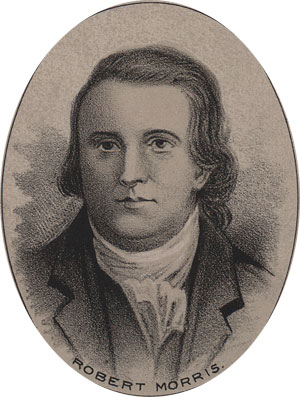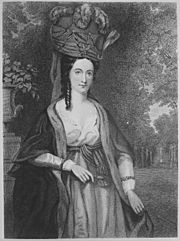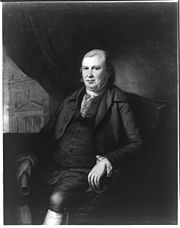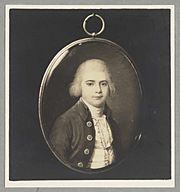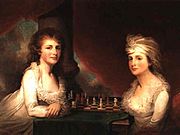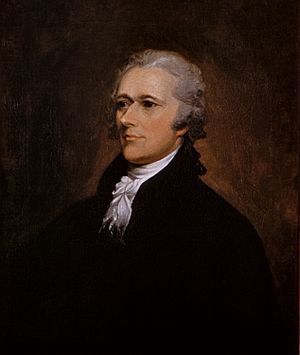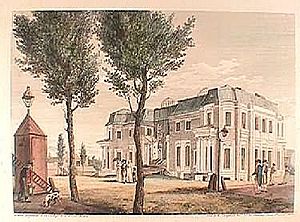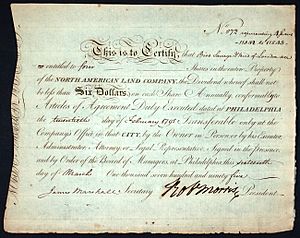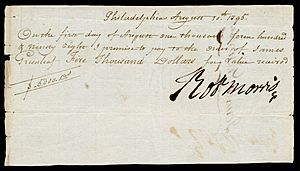Robert Morris (financier) facts for kids
Quick facts for kids
Robert Morris
|
|
|---|---|
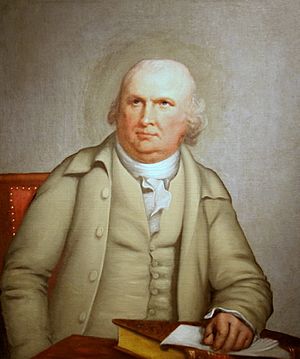 |
|
| United States Senator from Pennsylvania |
|
| In office March 4, 1789 – March 4, 1795 |
|
| Preceded by | Seat established |
| Succeeded by | William Bingham |
| United States Agent of Marine | |
| In office August 29, 1781 – November 1, 1784 |
|
| Preceded by | Alexander McDougall (Secretary of Marine) |
| Succeeded by | Benjamin Stoddert (Secretary of the Navy) |
| United States Superintendent of Finance | |
| In office June 27, 1781 – November 1, 1784 |
|
| Preceded by | Position established |
| Succeeded by | Alexander Hamilton (Secretary of the Treasury) |
| Delegate to the Second Continental Congress from Pennsylvania |
|
| In office 1775–1778 |
|
| Personal details | |
| Born | January 20, 1734 Liverpool, England |
| Died | May 8, 1806 (aged 72) Forked River, New Jersey, United States |
| Political party | Federalist |
| Spouse | Mary White (1749-1827) |
| Children | 7, including Thomas |
| Signature | |
Robert Morris Jr. (January 20, 1734 – May 8, 1806) was an important Founding Father of the United States. He was born in England and became a successful merchant. Morris played a key role in the American Revolution. He helped manage the country's money during the war.
He signed the Declaration of Independence, the Articles of Confederation, and the U.S. Constitution. From 1781 to 1784, he was the "Superintendent of Finance." This earned him the nickname "Financier of the Revolution." Many people see him as one of the creators of the U.S. financial system.
Contents
Early Life and Business
Growing Up in America
Robert Morris was born in Liverpool, England, in 1734. When he was 13, he moved to Maryland in North America. Two years later, he moved to Philadelphia. This was the biggest city in British North America at the time.
Becoming a Merchant
Morris started as an apprentice at a shipping and banking company. His father died in 1750 and left him a lot of money. Morris quickly became a key part of the company. In 1757, he became a full partner in the firm, which was renamed Willing Morris & Company.
His company was very successful. They traded goods with places like India, the Caribbean, and Europe. They also helped insure ships and supported government projects. In 1784, Morris helped fund the Empress of China voyage. This was the first American ship to visit China.
Morris's company was involved in various trades, including the slave trade. They handled some slave auctions for other importers. Morris continued to be involved in this trade until 1797.
Family Life
In 1769, Robert Morris married Mary White. She was the daughter of a wealthy lawyer. They had seven children together. Their son, Thomas Morris, later became a Congressman.
The Morris family lived in Philadelphia. They also had a country home called "The Hills." Later, Morris bought another estate called Morrisville. The family attended Christ Church.
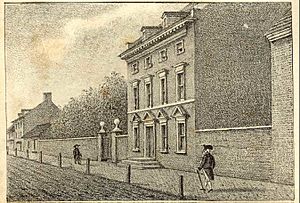
In 1781, Morris bought a house on Market Street in Philadelphia. In 1790, George Washington, the first U.S. President, used this house as his home. Morris and his family moved to a smaller house nearby. The "President's House" was the president's home until 1800.
Role in the American Revolution
Protesting British Taxes
In 1765, Britain passed the Stamp Act. This tax on paper goods was very unpopular. Morris joined other merchants to protest it. Parliament removed the tax, but later added others. Morris often protested these British tax policies. He felt he was "American in this dispute."
In 1774, colonists called for a boycott of British goods. Morris was elected to the Philadelphia committee that enforced this boycott.
Serving in Congress
When the American Revolutionary War began in 1775, Morris became very involved. He helped get weapons and supplies for the American cause. He was especially good at smuggling gunpowder.
In late 1775, Morris was chosen as a delegate to the Second Continental Congress. He worked on committees that handled trade, foreign affairs, and the Continental Navy. He helped get supplies and set up relations with other countries like France.
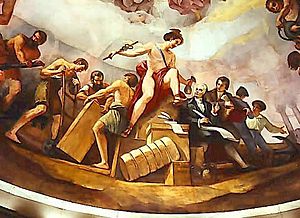
Morris initially hoped for peace with Britain. He did not vote for independence. However, he stepped aside during the vote, allowing Pennsylvania to support the Declaration of Independence. He later signed the Declaration, saying he would follow the will of the people.
After independence, Morris continued to get supplies for the war. He used American goods like tobacco to buy military supplies from Europe. He also helped commission privateers to attack British ships.
Financing the War Effort
By 1781, the U.S. government was in financial trouble. Congress created the job of "Superintendent of Finance" to fix this. Morris was chosen for this important role. He also became the "Agent of Marine," controlling the Continental Navy.
Morris worked closely with George Washington. He provided money and supplies for the Continental Army. This support helped Washington win the important Battle of Yorktown in 1781.
Morris also made big changes to government spending. He started the Bank of North America, the first national bank in the U.S. He also issued new money called "Morris notes," backed by his own funds. Morris believed the government needed the power to collect taxes to be stable. He tried to get states to agree to a federal tariff (tax on imports), but not all states agreed.
After the Revolution
Shaping the Constitution
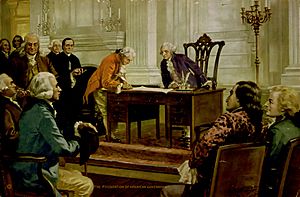
Morris resigned as Superintendent of Finance in 1784. He was frustrated by the weak national government. In 1787, he was chosen as a delegate to the Philadelphia Convention. This meeting created the new U.S. Constitution.
Morris did not speak much at the convention. However, many of his ideas, like giving the federal government power to tax, were included. He was one of only six people to sign both the Declaration of Independence and the U.S. Constitution.
Morris helped convince Pennsylvania to approve the new Constitution. In 1788, he was elected as one of Pennsylvania's first U.S. Senators.
Serving in the Senate
President Washington offered Morris the job of Secretary of the Treasury. Morris turned it down and suggested Alexander Hamilton instead. In the Senate, Morris supported Hamilton's financial plans. These included a federal tariff, a national bank, and paying off the national debt.
Morris also helped decide where the nation's capital would be. He wanted it in Philadelphia. Eventually, a compromise was reached. The capital would move to a new city on the Potomac River, but Philadelphia would be the temporary capital.
Later Business and Debt
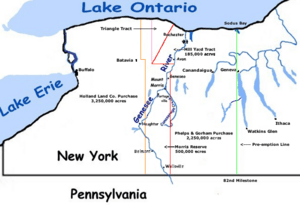
After leaving the Senate, Morris focused on business again. He became very interested in buying and selling large amounts of land. He bought huge areas in New York and other states. He often borrowed a lot of money to do this, hoping to sell the land quickly for a profit.
Morris and his partners bought millions of acres across the U.S. They also bought many lots in the new capital, District of Columbia. They formed the North American Land Company to help finance these deals.
However, the land market struggled. Morris and his partners could not sell their land fast enough. They owed a lot of money. Morris also started building a huge mansion in Philadelphia. It was never finished and became known as "Morris's folly."
Morris became deeply in debt. He could not pay his creditors (people he owed money to). In 1798, he was sent to debtors' prison in Philadelphia. He stayed there for three and a half years.
Final Years and Legacy
Morris was released from prison in 1801 after a new bankruptcy law was passed. He was still very poor. His wife, Mary, received a small yearly payment that helped them live.
Robert Morris died in Philadelphia on May 8, 1806. There were no public ceremonies for his death. He was buried at Christ Church.
Historical Importance
Historians have different views on Robert Morris. Some say he is not as well-known as he should be, given his huge role in financing the American Revolution. He is seen as a key figure in creating the U.S. financial system.
Memorials and Honors
- Morris's picture appeared on U.S. currency, including $1,000 bills and $10 silver certificates.
- Robert Morris University is named after him.
- Mount Morris, New York, is named in his honor.
- Several U.S. Navy and Coast Guard ships have been named USS Morris or USRC Morris.
- Morrisville, Pennsylvania, is named for him.
- A statue of Robert Morris stands in Independence National Historical Park in Philadelphia.
- A monument to Morris, Washington, and Haym Salomon is in Chicago.
- His former estate, Summerseat, is a National Historic Landmark.
- Part of the Liberty Bell Center is on land that was once part of Morris's "President's House."
Images for kids
-
The United States following the signing of the Treaty of Paris
See also
 In Spanish: Robert Morris (financiero) para niños
In Spanish: Robert Morris (financiero) para niños
- List of richest Americans in history
- List of United States senators born outside the United States
 | Delilah Pierce |
 | Gordon Parks |
 | Augusta Savage |
 | Charles Ethan Porter |


